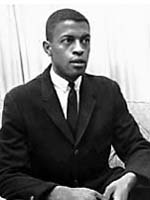David Richmond (activist)
| David Richmond | |
|---|---|

David Richmond circa 1960
|
|
| Born |
April 20, 1941 Greensboro, North Carolina |
| Died | December 7, 1990 (aged 49) Greensboro, North Carolina |
| Cause of death | Lung cancer |
| Resting place | Carolina Biblical Gardens, Jamestown, North Carolina |
| Alma mater | North Carolina A&T State University |
| Spouse(s) | Yvonne Bryson |
| Children | Angela Morton Obi David "Chip" Richmond Jr. Hadelyn Richmond Massenburg |
David Leinail Richmond (April 20, 1941 – December 7, 1990) was a civil rights activist who is best known as a member of the Greensboro Four, a group of African American college students who, on February 1, 1960, sat down at a segregated Woolworth's lunch counter in downtown Greensboro, North Carolina challenging the store's policy of denying service to non-white customers; an event which is credited as gaining national sentiments for the struggle of African-American citizens during the 1960s.
Richmond was born on April 20, 1941 in Greensboro, North Carolina. He grew up in the then rural East White Oaks neighborhood, and received his early education at James B. Dudley High School, where he was known as a well-rounded student who belonged to many clubs and participated in many sports. After graduating from High School, Richmond entered North Carolina Agricultural and Technical State University in the fall of 1959, where he majored in Business administration and accounting.
On February 1, 1960; Richmond, along with three other A&T freshmen: Ezell Blair, Jr., Franklin McCain and Joseph McNeil, walked together from the university's library to the downtown Greensboro Woolworth store. Once there, the men purchased items from a desegregated counter, and then sat down at the "whites only" lunch counter where the group was refused service. Richmond and the group stayed until the store closed, and then left to return the next day. As media coverage of the demonstrations grew, more protests were being staged through the state of North Carolina, and other Southern cities. Sales at boycotted stores began to be affected by the protests, which led store owners to offer service to all customers in their establishments.
...
Wikipedia
